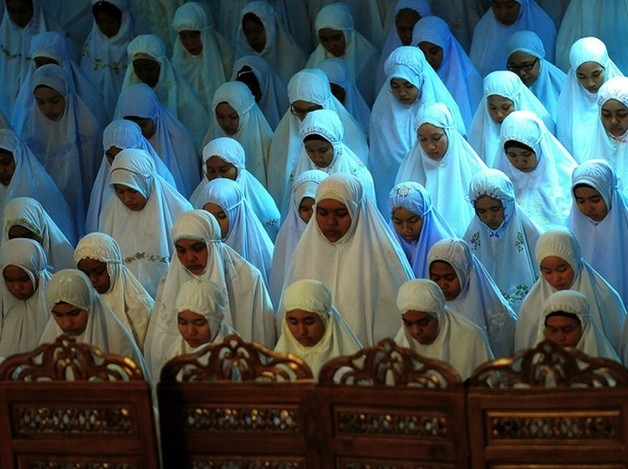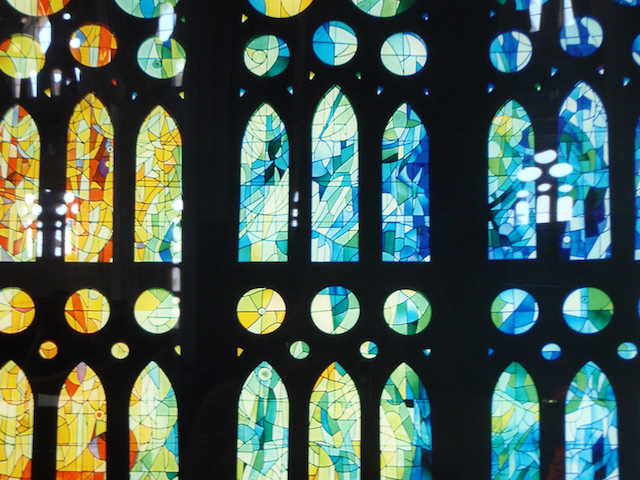Do I get hungry? Yes, that’s the point.

Editor’s Note: Today marks the midway point of Ramadan, the month-long Muslim observance when fasting is key. Open City’s Nadia Q. Ahmad enlightened us last year with this tongue and cheek FAQ.
This month, Muslims across the world are observing the fasting month of Ramadan. Here, the most common inquiries about Islam’s holiest month.
1. No food or water for thirty days straight? Don’t you, like, die?
No, but I wouldn’t be caught dead with food in my mouth. Ramadan takes place over the course of either 29 or 30 days (depending on the cycle of the moon), during which a Muslim will fast—not throughout the entire month, but on each day that month from dawn to sunset. It’s considered holy because it was the month during which the Qur’an is said to have been revealed to the Prophet Muhammad (peace be upon him).
But wait, there’s more. Muslims also abstain from smoking, sex, gossip, cursing, showing uncontrolled anger—you know, the (perceived) bad habits. It isn’t based on a masochistic urge to starve yourself to the point of extreme exhaustion. Rather, it’s to sharpen your attention to how you would normally interact with your worldly environment, and to develop habits for spiritual strength that can hopefully be sustained into the months and years that follow. Think Yom Kippur or Lent, but for Muslims. Last, the goal has nothing to do with shedding those extra pounds—sorry.
2. No food or water for the entire day? You must be eating like a pig as soon as the sun sets.
The body’s digestive system loses practice throughout the day during Ramadan, so most people get full pretty quickly. In the same way that it’s ill-advised to needlessly tempt yourself throughout the day while fasting, it’s also not the best idea to voraciously scarf down a heaping plate at night. Muslims are encouraged to spend these blessed nights in prayer and recitation of the Qur’an. Suhoor, the pre-dawn meal, helps in avoiding the physical weakness caused by fasting.
Also, since eating pigs is haraam (forbidden) in Islam, I’m pretty sure eating like a pig would be too.
3. Fasting is one of the five pillars of Islam, right? Doesn’t that mean all Muslims are expected to observe it? I can’t believe you’re starving little children!
While it is obligatory for Muslims to fast if they are sound of body and mind, several categories of people are exempt: pregnant or breastfeeding women; menstruating women; people who are sick or face health risks; people who are traveling; and children who have not reached puberty. If you miss the fast, you must make it up later; if physically unable to do so, you must provide food for someone else through charity. So no, we don’t starve children, whether they’re in the womb or not. They have their own right to develop strong teeth and bones.
4. Oh, it’s happening right now? But it wasn’t this time last year… Isn’t it supposed to be in December or something?
Ramadan is at a different time in the Gregorian calendar every year. This is because it’s based on a lunar calendar, which at about 355 days per lunar year, is 10 to 12 days shorter than the Gregorian. Each month starts when the first sliver of the new moon appears in the sky. This is also the way that Muslims mark Eid-ul-Fitr, the holiday that celebrates the end of Ramadan (though there’s always a healthy discussion as to how exactly to go about calculating it).
This slight gap between the two calendars places the first day of Ramadan at about 10 or 12 Gregorian calendar days earlier with each year that passes, pulling the month back through all of the different seasons over the course of 36 years. Gives it a little variation, I suppose, so you’re not always fasting at the same time.
5. So, aren’t you hungry?
Do I get hungry? Yes. That’s the point.
And yet, it doesn’t even come close to the point. It’s surprising to observe how much you actually would have eaten had you not been fasting. And again, it’s not just in terms of food: it’s taking note of where you would have otherwise drawn the day’s energy, and on what you would have otherwise focused that energy. Sure, it’s hard—you’re no saint. But it’s not necessarily herculean either (even for some Olympians). If you’re lucky enough to know that you’ll likely have something to break your fast with at sunset, you’ll sometimes notice that although hunger has its way of reminding you of your emptiness, it’s strangely capable of providing you with other ways to fill.
…So, do I get hungry? Yes. Still, it’s Ramadan, so I’m not gonna lie: I’d appreciate it if you didn’t ask me that again.
How Ramadan literate are you? Tweet us at @aaww if you’ve ever asked questions 1-5. Or, tell us the queries you always get when this religious season comes around.



